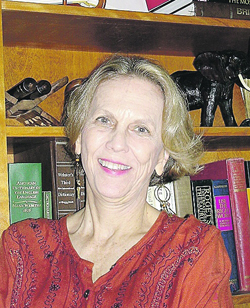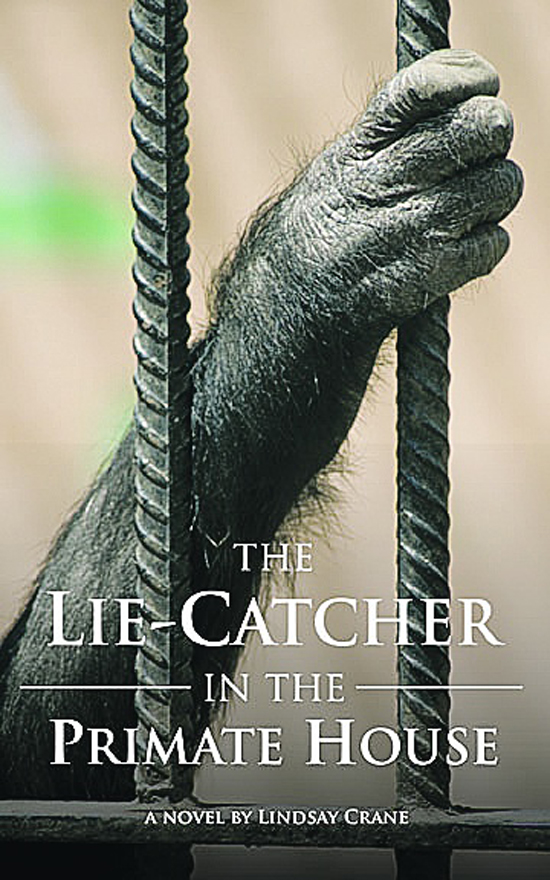 | | | Author Linda Riebel Photo provided
| | | | | | "I didn't set out to hobnob with hairy apes. Well, maybe some of my past boyfriends might qualify. I just set out to help a colleague. Given what I do for a living, that happens a lot, but it's usually more tame and civilized." So begins Linda Riebel's novel The Lie-Catcher in the Primate House, written under the nom de plume Lindsay Crane. Full of intrigue and excitement, Reibel's thriller about endangered animal smuggling is also an intimate portrait of her heroine and narrator, Julie Heidebrecht. An effervescently energetic voice, Dr. Julie Heidebrecht is a UC Berkeley professor of psychology who is a specialist on human deception and a veritable "lie-catcher."
 Capable of reading people's body language, physical ticks and voice patterns, Julie, as she insists everyone call her, becomes part of a government task force that aims to stop poachers and smugglers from bringing animals into the United States. Although she is at first hesitant to become involved, Julie becomes a passionate animal and human rights advocate as she learns more and more about wild animal trafficking. Traveling around the world, from the Bay Area to Uganda, Julie learns, and subsequently informs readers, about psychology, primates, the international illicit animal trade, and even the Lord's Resistance Army's Joseph Kony.
Capable of reading people's body language, physical ticks and voice patterns, Julie, as she insists everyone call her, becomes part of a government task force that aims to stop poachers and smugglers from bringing animals into the United States. Although she is at first hesitant to become involved, Julie becomes a passionate animal and human rights advocate as she learns more and more about wild animal trafficking. Traveling around the world, from the Bay Area to Uganda, Julie learns, and subsequently informs readers, about psychology, primates, the international illicit animal trade, and even the Lord's Resistance Army's Joseph Kony.
 As a professor and professional the novel's heroine admits, "I also have a passion for precision...I drill students about this, insisting that they must use real evidence." Riebel, a Lafayette resident, takes after her protagonist or vice versa. The local author, who has advanced degrees in human psychology and has traveled extensively around the world helping to rescue wildlife and habitats, clearly draws from her own life and experiences in the novel. It thus comes to no surprise that due to her own professional training or perhaps as a nod to her heroine's exacting personality, Riebel culminates the novel with a note that directs readers to journal articles on deception studies and information on how to help save endangered species.
As a professor and professional the novel's heroine admits, "I also have a passion for precision...I drill students about this, insisting that they must use real evidence." Riebel, a Lafayette resident, takes after her protagonist or vice versa. The local author, who has advanced degrees in human psychology and has traveled extensively around the world helping to rescue wildlife and habitats, clearly draws from her own life and experiences in the novel. It thus comes to no surprise that due to her own professional training or perhaps as a nod to her heroine's exacting personality, Riebel culminates the novel with a note that directs readers to journal articles on deception studies and information on how to help save endangered species.
 The Lie-Catcher in the Primate House is a thoroughly researched and plausible, if fantastical, novel that provides readers with real information regarding the state of the world's endangered animals. Although both academics and professionals have a reputation for dry and pedantic writing, Riebel's writing is quick, witty and reflective of the chaotic pace of life. Her personal passion for endangered animals and the preservation of natural habitats resonates from each page in a persuasive manner that inspires readers to think about wild animal conservation in a new way. For instance, Riebel invites readers to question what truly differentiates animals, particularly primates, from humans and therein frames ongoing debates on animal testing and habitat conservation in a new, thought provoking, light.
The Lie-Catcher in the Primate House is a thoroughly researched and plausible, if fantastical, novel that provides readers with real information regarding the state of the world's endangered animals. Although both academics and professionals have a reputation for dry and pedantic writing, Riebel's writing is quick, witty and reflective of the chaotic pace of life. Her personal passion for endangered animals and the preservation of natural habitats resonates from each page in a persuasive manner that inspires readers to think about wild animal conservation in a new way. For instance, Riebel invites readers to question what truly differentiates animals, particularly primates, from humans and therein frames ongoing debates on animal testing and habitat conservation in a new, thought provoking, light.
 At its heart, The Lie-Catcher in the Primate House is undeniably a conservation novel that aptly positions a local, Bay Area heroine within a web of international intrigue and mystery to show the need for wild animal conservation. For those already interested in such issues this Lindsay Crane novel will undeniably resonate and for those readers who have not really thought about conservation, the novel provides an entertaining introduction into some of the dangers facing exotic animals today.
At its heart, The Lie-Catcher in the Primate House is undeniably a conservation novel that aptly positions a local, Bay Area heroine within a web of international intrigue and mystery to show the need for wild animal conservation. For those already interested in such issues this Lindsay Crane novel will undeniably resonate and for those readers who have not really thought about conservation, the novel provides an entertaining introduction into some of the dangers facing exotic animals today.
 As August and summer weather finally arrive in Lamorinda, The Lie-Catcher in the Primate House is the perfect summer read. The loveable sleuth, exciting plot, and informative prose will keep your fingers turning the pages until the very end. The novel is currently available at Amazon.com and Barnesandnoble.com as both a paperback and in electronic form.
As August and summer weather finally arrive in Lamorinda, The Lie-Catcher in the Primate House is the perfect summer read. The loveable sleuth, exciting plot, and informative prose will keep your fingers turning the pages until the very end. The novel is currently available at Amazon.com and Barnesandnoble.com as both a paperback and in electronic form.

|

